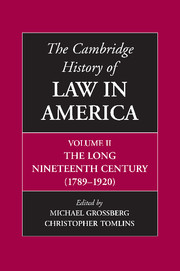Book contents
- Frontmatter
- 1 Law and the American State, from the Revolution to the Civil War: Institutional Growth and Structural Change
- 2 Legal Education and Legal Thought, 1790–1920
- 3 The Legal Profession: From the Revolution to the Civil War
- 4 The Courts, 1790–1920
- 5 Criminal Justice in the United States, 1790–1920: A Government of Laws or Men?
- 6 Citizenship And Immigration Law, 1800–1924: Resolutions Of Membership And Territory
- 7 Federal Policy, Western Movement, and Consequences for Indigenous People, 1790–1920
- 8 Marriage and Domestic Relations
- 9 Slavery, Anti-Slavery, and the Coming of the Civil War
- 10 The Civil War And Reconstruction
- 11 Law, Personhood, and Citizenship in the Long Nineteenth Century: the Borders of Belonging
- 12 Law in Popular Culture, 1790–1920: The People and the Law
- 13 Law and Religion, 1790–1920
- 14 Legal Innovation and Market Capitalism, 1790–1920
- 15 Innovations in Law and Technology, 1790–1920
- 16 The Laws of Industrial Organization, 1870–1920
- 17 The Military in American Legal History
- 18 The United States and International Affairs, 1789–1919
- 19 Politics, State-Building, and the Courts, 1870–1920
- Bibliographic Essays
- Notes on Contributors
- Index
- References
19 - Politics, State-Building, and the Courts, 1870–1920
Published online by Cambridge University Press: 28 November 2008
- Frontmatter
- 1 Law and the American State, from the Revolution to the Civil War: Institutional Growth and Structural Change
- 2 Legal Education and Legal Thought, 1790–1920
- 3 The Legal Profession: From the Revolution to the Civil War
- 4 The Courts, 1790–1920
- 5 Criminal Justice in the United States, 1790–1920: A Government of Laws or Men?
- 6 Citizenship And Immigration Law, 1800–1924: Resolutions Of Membership And Territory
- 7 Federal Policy, Western Movement, and Consequences for Indigenous People, 1790–1920
- 8 Marriage and Domestic Relations
- 9 Slavery, Anti-Slavery, and the Coming of the Civil War
- 10 The Civil War And Reconstruction
- 11 Law, Personhood, and Citizenship in the Long Nineteenth Century: the Borders of Belonging
- 12 Law in Popular Culture, 1790–1920: The People and the Law
- 13 Law and Religion, 1790–1920
- 14 Legal Innovation and Market Capitalism, 1790–1920
- 15 Innovations in Law and Technology, 1790–1920
- 16 The Laws of Industrial Organization, 1870–1920
- 17 The Military in American Legal History
- 18 The United States and International Affairs, 1789–1919
- 19 Politics, State-Building, and the Courts, 1870–1920
- Bibliographic Essays
- Notes on Contributors
- Index
- References
Summary
As the last federal troops departed the South in the late 1870s, hundreds were sent west to repress a strike by the workers on Jay Gould’s newly consolidated railway lines. The “Southern question,” a Virginia newspaper observed, had been put to rest. Now, the “trust question” and “the relation of labor and capital” would dominate the nation’s politics. The dislocations and discontent produced by new national corporations, national markets, and burgeoning industrial centers brought forth a welter of new legislative responses and new uses of state power, including experiments in administrative state-building at both state and national levels. Not only nation-spanning railroads and manufacturing firms but also mass immigration from abroad and increasingly bitter inequalities and class conflict at home presented new challenges that made America’s pre-Civil War traditions of local self-government and Jacksonian laissez-faire seem inadequate and antiquated.
When Europeans spoke of the “statelessness” of nineteenth-century America, they had in mind the absence of a powerful central administration and of a national “state elite” to run it. “Administration” and “bureaucracy” were foreign-sounding terms. They seemed antithetical to the American system of government, which had been born in revolt against just such a modern state. Instead, antebellum America possessed a small, unassuming national government, which left most tasks to state lawmakers, local officials, and the courts. The leaders of bar and bench were, in Tocqueville’s famous phrase, America’s “high political class”; they were the rough equivalent of Europe’s administrative state elites. Common law judges hammered out and administered a remarkable portion of the important rules of social and economic life.
- Type
- Chapter
- Information
- The Cambridge History of Law in America , pp. 643 - 696Publisher: Cambridge University PressPrint publication year: 2008
References
- 3
- Cited by



